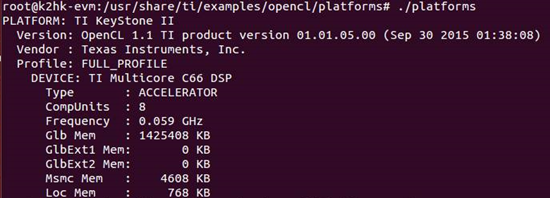Hello
I encountered a problem when i run openCL code on EVMK2H .
I have attempted to run TI openCL examples which can show some platform information ,and the results show the Device operate at 0.059GHz frequency
As I know,AK2H12/14 SOC have eight DSP cores which can operate at 1.2 GHz frequency。
I also attempt to run same openCL code ,but TI DSP execution time is apparently higher than Intel CPU execution time.
So i think that maybe some setting should be revised to make DSP cores can run at higher frequency.




